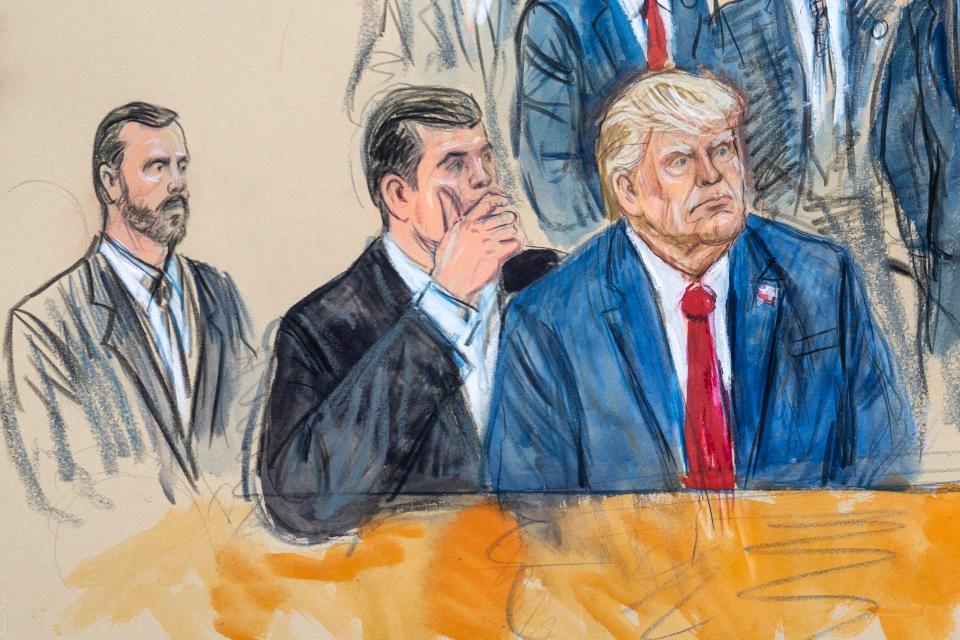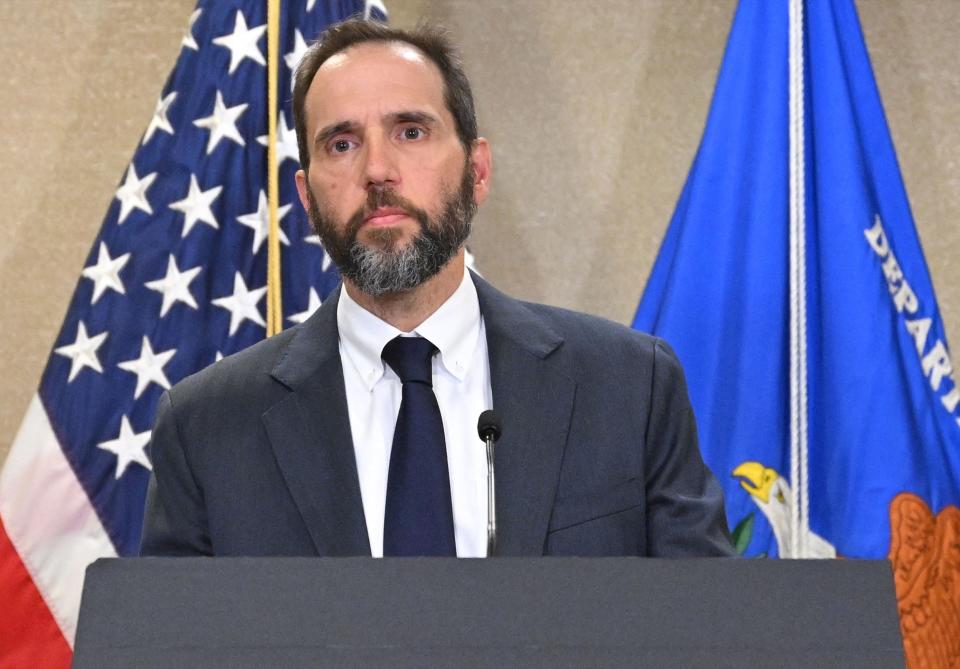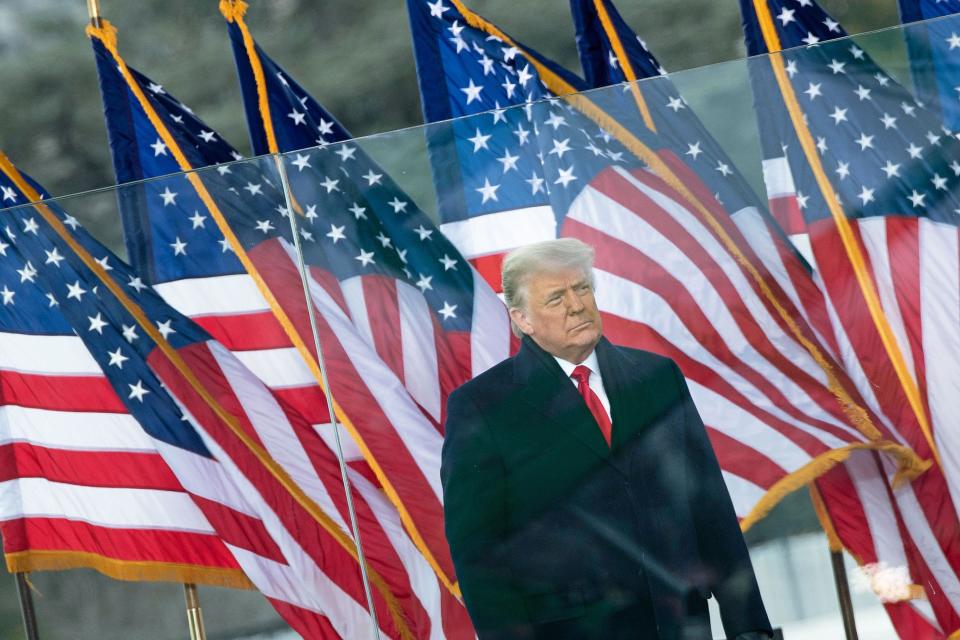The Supreme Court is about to hear Trump's 'absolute immunity' arguments in a case that could kill his January 6 indictment
Donald Trump is asking the Supreme Court to recognize that he had total legal immunity as president.
He wants to toss the special counsel Jack Smith's case over his attempt to overturn the 2020 election.
The Supreme Court has recognized immunity before — but never in the sweeping fashion Trump requests.
Former President Donald Trump is set to have his highest-stakes legal battle for his highest-stakes criminal case on Thursday.
His lawyers are facing off against the Justice Department, trying to persuade the Supreme Court that Trump should have total immunity from criminal prosecution — even for trying to overturn the results of an election.
The indictment, brought by the special counsel Jack Smith in Washington, DC, federal court, accuses Trump of obstructing Congress by conspiring to overturn the results of the 2020 election. The indictment alleges that by facilitating fake electors, pressuring public officials, and directing his supporters to the Capitol on January 6, 2021, where they rioted, Trump attempted to rob Americans of rightful votes.
Trump is asking the Supreme Court to grant him a sweeping immunity mandate as he runs to recapture the presidency. If the court rules his way and he wins again in November, he could push the bounds of presidential criminality.
Former President Richard Nixon famously declared to the journalist David Frost, "When the president does it, that means that it is not illegal, by definition." Trump and his lawyers' views may put that to the test.
Presidents already have some protections. A sitting president cannot be indicted under Justice Department guidelines that date back decades. The Supreme Court also previously extended former presidents' protection from civil lawsuits in a case brought by a former Air Force contractor against Nixon. Trump wants to extend this shield even further if a former president can argue that the action in question fell under the scope of their official duties.
Beyond the presidency's future, the court's decision may have ramifications not only for the election-interference case but "really all four of the criminal cases" Trump faces, as one of his lawyers has said.
Another indictment, in Georgia, over Trump's attempt to overturn his election result there, features an overlapping set of facts. And Smith has brought a different criminal case in Florida, accusing Trump of taking classified documents to Mar-a-Lago after he left the presidency and refusing to return them.
Trump won't be at the Supreme Court hearing. He's on trial in New York on yet another set of charges that allege he messed with a different election.
Prosecutors in the Manhattan district attorney's office say Trump violated business record-keeping laws 34 times by disguising hush-money payments to Stormy Daniels, an adult-film actor who says she had an affair with him, to keep her quiet ahead of the 2016 presidential election.
Todd Blanche, his lead lawyer in the Manhattan trial — who's also Trump's lead counsel in the Mar-a-Lago case and a defense attorney in the DC case — said the Supreme Court hearing "comes back to the multiple different indictments" when he requested that his client be allowed to attend the Supreme Court hearing.
But criminal defendants are required to be in court during their trial proceedings, and the Manhattan judge presiding over the case refused to allow Trump a break to attend oral arguments.
The tabloid executive David Pecker, the first witness at the trial, was on the stand Tuesday.
Trump wants total immunity
In the DC election-interference case, Trump argued that presidential immunity — a doctrine typically understood to provide legal protections to US presidents over the course of their duties — shields him from prosecution.
He also said the cases should be dismissed on double-jeopardy grounds since the US Senate failed to convict him when he was impeached over his election interference.
And while the Supreme Court has previously ruled that presidents can't be immune to criminal proceedings related to the "outer perimeter" of their duties — it forced Trump to comply with a subpoena for the Manhattan criminal case in 2021 — Trump's lawyers now argue he is "categorically immune from federal criminal prosecution for any act conceivably within the outer perimeter of his executive responsibility."
US District Judge Tanya Chutkan, an appointee of former President Barack Obama, denied Trump's motion to dismiss the case, ruling that being a former president "does not confer a lifelong 'get-out-of-jail-free' pass" and that while the prosecution was "unprecedented," so were his alleged crimes.

Trump's lawyers pressed on. In an appeals-court hearing, his lawyers said a president could even order SEAL Team Six to assassinate a political rival and come away unscathed as long as Congress was OK with it.
A three-judge appellate court panel backed up Chutkan's decision, writing that Trump "is answerable in court for his conduct."
"For the purpose of this criminal case, former President Trump has become citizen Trump, with all of the defenses of any other criminal defendant," the appellate judges wrote. "But any executive immunity that may have protected him while he served as President no longer protects him against this prosecution."
The Supreme Court has agreed to weigh whether impeachment counts as double jeopardy with a criminal prosecution and "whether and if so to what extent does a former president enjoy presidential immunity from a criminal prosecution for conduct alleged to involve official acts during his tenure in office."
In a brief to the high court, Smith noted that the US Constitution doesn't give the president any role in certifying elections, much less the power to "defraud the United States in the certification of presidential-election results, obstruct proceedings for doing so, or deprive voters of the effect of their votes."
Trump's lawyers have warned that a decision to allow former presidents to be prosecuted would unleash chaos. The threat of criminal charges from a politically motivated Justice Department "will hang like a millstone around every future President's neck," they argued.
"Without immunity from criminal prosecution, the Presidency as we know it will cease to exist," Trump's lawyers wrote in one brief.

Lawyers on Smith's team wrote in their own briefs that Trump's arguments were ahistorical. They pointed to the fact that Nixon accepted President Gerald Ford's sweeping pardon, which Ford was reported to view as an admission of guilt. The special prosecutor Leon Jaworski weighed indicting Nixon. The independent prosecutor Robert Ray also came close to charging former President Bill Clinton with lying under oath about his affair with Monica Lewinsky.
"Since Watergate, the Department of Justice has held the view that a former President may face criminal prosecution, and Independent and Special Counsels have operated from that same understanding," Smith's team wrote. "Until petitioner's arguments in this case, so had former Presidents."
Donald Ayer, a former Justice Department official in the Ronald Reagan and George H.W. Bush administrations, said the case was a test for the US as a democracy.
"This may indeed be the most important US Supreme Court case in the history of our country," he told journalists at a panel organized by the Defend Democracy Project. "Because our election this year is not just about who will be president, it's also about whether our country still believes in democracy and has a functioning rule of law."
The Supreme Court is weighing another case over the Justice Department's decision to charge hundreds of January 6 rioters with obstructing "an official proceeding" — one of the four counts Smith brought against Trump.
At a hearing last week, the justices appeared inclined to rule that prosecutors had viewed the statute too broadly, reports said, raising the possibility that Trump could score a win and get that charge dropped even if his case goes to trial.
Trump probably won't go to trial again before the November election
Chutkan originally scheduled the trial to begin at the beginning of March. But, tied up in appeals, it's now unlikely to take place before the November election.
The Supreme Court will probably issue a decision in late April. At that point, Chutkan can resume the pre-trial process. If she continues to follow the previous timeline she'd planned for pre-trial hearings, jury selection probably wouldn't begin until late October at the very earliest. Given Trump's candidacy, it's hard to imagine her insisting that he spend the final days of the election in a courtroom.
If Trump becomes president again, he may try to pardon himself or pressure the Justice Department to withdraw the case.

The Mar-a-Lago case, too, would probably be on the chopping block in a Trump presidency. Neither it nor the Georgia prosecution have trial dates scheduled yet, and they most likely won't be tried before 2025 at the earliest.
Some former government officials who served under Trump have urged the Supreme Court not to grant him immunity. One group of ex-military officials filed a brief arguing that giving presidents "absolute immunity" would allow them to use the armed forces for "criminal ends" and "threaten to inject chaos into military operations." A group of founding-era historians have also filed a brief saying the concept of limitless presidential immunity contradicts what the US Constitution's framers intended.
Mark Meadows, who was Trump's chief of staff when he tried to overturn the 2020 election results and is a codefendant in the Fulton County criminal case in Georgia, also filed a brief with the Supreme Court. He asked that, if the court were to find that Trump could be liable in the case, it ensured that lower-ranking employees such as himself could still have immunity protections.
Norm Eisen, a former White House lawyer in Barack Obama's administration, said the Supreme Court could keep the case moving quickly by deciding only whether Trump deserved immunity in Smith's case — and setting aside more abstract questions about the doctrine.
"Donald Trump has articulated an outrageous, unprecedented, and ahistorical assertion of absolute immunity," he said at the Defend Democracy Project panel. "The Supreme Court need not stray into other questions just because Trump has made it easy for them. They should decide this case."
Read the original article on Business Insider

 Yahoo News
Yahoo News 
